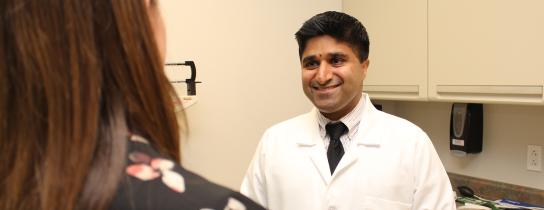
Diseases of the Heart: A Look into Coronary Artery Disease
The heart is one of your body’s most vital organs and there are many diseases that can affect its health and function. Knowing your risk factors is the key to early detection and prevention of heart disease. Speak with your Primary Care Physician and a Cardiologist if you have any concerns and learn about Coronary Artery Disease in order to take steps to prevent this disease.
What is Coronary Artery Disease?
Coronary Artery Disease (CAD) is a hardening of the heart vessels coupled with plaque buildup. It is defined by lipid deposition in the arteries of the heart. There are two types of CAD, obstructive and non-obstructive. With obstructive plaque, people will experience symptoms like chest pain and shortness of breath, while non-obstructive CAD will usually not cause symptoms. A heart attack is more likely with obstructive lesions, but is still possible with non-obstructive plaque under the right conditions.
What are the Risk Factors of CAD??
The more risk factors you have, the more likely you are to have CAD. Risk factors include:
- Age
- Smoking
- Hypertension
- High cholesterol
- Diabetes
- Family history of CAD
The amount of risk factors that one has increases his/her risk and often raises the suspicion of the doctor caring for the patient.
What can you do to prevent it?
There is not much therapy that has been consistently shown to significantly decrease the amount of plaque after it is formed, so preventing formation is key! Take these steps to help prevent plaque formation:
-Quit smoking. This is a major contributor to vascular disease and calcified plaque production.
-Eat less processed foods and red meats. Substitute them with more vegetables, fruits and nuts.
-Exercise. Aerobic exercise can lower body fat, blood sugar levels and raise HDL levels.
-If instructed by a doctor, take medication:
-When indicated, statin medications can reduce bad cholesterol and cause some plaque shrinking in addition to stabilizing already
existing plaque.
-Aspirin has been shown to decrease the risk of heart attack and stroke in selected patients. Recent studies show that if you are not at an
increased cardiovascular risk, a baby aspirin may be slightly harmful. You should ask your doctor if you would benefit from aspirin.
Who should be tested? What are the tests?
Anybody with symptoms of CAD should be tested. If you are experiencing chest discomfort or shortness of breath, CAD is a possibility that you should ask your doctor about.
The EKG is the most basic of tests, but is often only effective at showing an acute heart attack or active lack of blood flow to the heart. Stress tests are better at showing obstructive CAD, especially with exertion. For people that are not symptomatic, but are concerned about their risk of having CAD and potential heart disease in the future, a calcium score may be used. This test identifies calcium content in the coronary arteries which correlates with the amount of plaque. An intermediate to high score will help your doctor tailor treatment that can help prevent worsening of CAD, while a score of zero can help calm your fears.
Heart Disease remains a significant problem around the United States and identifying your risk factors and addressing them early remain the best way to prevent the problem from affecting you. If you have any concerns, speak with your Primary Care Physician. They’ll be able to assess the issue, order tests, and refer you to a Cardiologist if needed.
Neel Khanna, MD, MPH is an Interventional Cardiologist at Crystal Run Healthcare. He earned his Medical Degree and completed his Residency in Internal Medicine at SUNY Downstate Medical Center in Brooklyn, NY. He is Fellowship-trained in Cardiology from NYMC/Westchester Medical Center in Valhalla, NY and Interventional Cardiology from Lenox Hill Hospital in New York, NY. Dr. Khanna is Board Certified in Cardiovascular Disease, Interventional Cardiology, Echocardiography, Internal Medicine, Nuclear Cardiology, and Vascular Imaging.

 Optum Radiology at Crystal Run Healthcare
Optum Radiology at Crystal Run Healthcare Same and next-day pediatric appointments
Same and next-day pediatric appointments